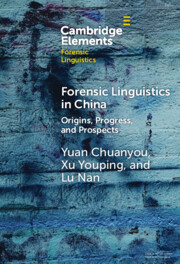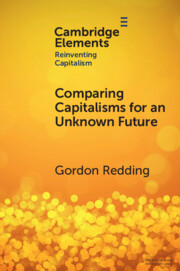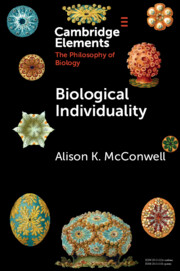95 results
6 - The Shape of History
-
- Book:
- Some New World
- Published online:
- 29 March 2024
- Print publication:
- 18 April 2024, pp 283-352
-
- Chapter
- Export citation
Innovation in surgical treatment of hypertrophic obstructive cardiomyopathy in children
-
- Journal:
- Cardiology in the Young , First View
- Published online by Cambridge University Press:
- 11 April 2024, pp. 1-10
-
- Article
- Export citation

Forensic Linguistics in China
- Origins, Progress, and Prospects
-
- Published online:
- 04 April 2024
- Print publication:
- 02 May 2024
-
- Element
- Export citation
Philosophical Agreement and Philosophical Progress
-
- Journal:
- Episteme , First View
- Published online by Cambridge University Press:
- 14 February 2024, pp. 1-19
-
- Article
-
- You have access
- Open access
- HTML
- Export citation
Chapter 16 - Evolution and the Human
-
-
- Book:
- Nineteenth-Century Literature in Transition: The 1860s
- Published online:
- 01 February 2024
- Print publication:
- 08 February 2024, pp 289-307
-
- Chapter
- Export citation
10 - The Strategy of Structural Reforms
- from Part II - Ethical Assessments and Policy Perspectives
-
- Book:
- Power and Inequality
- Published online:
- 04 January 2024
- Print publication:
- 18 January 2024, pp 237-255
-
- Chapter
- Export citation
Kant on Free Speech: Criticism, Enlightenment, and the Exercise of Judgement in the Public Sphere
-
- Journal:
- Kantian Review / Volume 29 / Issue 1 / March 2024
- Published online by Cambridge University Press:
- 15 December 2023, pp. 61-80
- Print publication:
- March 2024
-
- Article
-
- You have access
- Open access
- HTML
- Export citation
Chapter 6 - War and the ‘Science of Man’
- from Part II - Developing Questions
-
- Book:
- Imagining War and Peace in Eighteenth-Century Britain, 1690–1820
- Published online:
- 10 January 2024
- Print publication:
- 23 November 2023, pp 157-182
-
- Chapter
- Export citation
2 - Mill’s Principle
- from Part I - Background Controversies
-
- Book:
- Enforcing Morality
- Published online:
- 03 November 2023
- Print publication:
- 16 November 2023, pp 23-43
-
- Chapter
- Export citation
5 - “You wont notice me now but you’ll wish you had”
- from Part I - The Enslaved
-
- Book:
- Old Age and American Slavery
- Published online:
- 27 October 2023
- Print publication:
- 16 November 2023, pp 164-194
-
- Chapter
- Export citation
1 - Enlightenment and the American Revolution
- from Part I - Enlightenment and Culture
-
-
- Book:
- The Cambridge History of the Age of Atlantic Revolutions
- Published online:
- 20 October 2023
- Print publication:
- 09 November 2023, pp 53-79
-
- Chapter
- Export citation
“Utopia shut up shop”: Hopeless Futures, Populism, and the American Dream
-
- Journal:
- European Journal of Sociology / Archives Européennes de Sociologie / Volume 64 / Issue 2 / August 2023
- Published online by Cambridge University Press:
- 07 November 2023, pp. 223-257
-
- Article
-
- You have access
- Open access
- HTML
- Export citation
1 - Archival Traps
-
- Book:
- Mooring the Global Archive
- Published online:
- 19 October 2023
- Print publication:
- 05 October 2023, pp 1-38
-
- Chapter
-
- You have access
- Open access
- HTML
- Export citation
The Predicament of Practical Reason
-
- Journal:
- Kantian Review / Volume 28 / Issue 3 / September 2023
- Published online by Cambridge University Press:
- 02 October 2023, pp. 459-466
- Print publication:
- September 2023
-
- Article
-
- You have access
- Open access
- HTML
- Export citation

Comparing Capitalisms for an Unknown Future
- Societal Processes and Transformative Capacity
-
- Published online:
- 11 August 2023
- Print publication:
- 07 September 2023
-
- Element
- Export citation
ADAM SMITH, COLONIALISM, AND LIBERAL IMPERIALISM
-
- Journal:
- National Institute Economic Review / Volume 265 / Autumn 2023
- Published online by Cambridge University Press:
- 07 November 2023, pp. 39-50
- Print publication:
- Autumn 2023
-
- Article
- Export citation
9 - Drive
- from Part II - The Benefits of Creativity
-
- Book:
- The Creativity Advantage
- Published online:
- 27 July 2023
- Print publication:
- 29 June 2023, pp 125-136
-
- Chapter
- Export citation
10 - Kant on History, or Theodicy for Mortal Gods
-
-
- Book:
- Time, History, and Political Thought
- Published online:
- 08 June 2023
- Print publication:
- 22 June 2023, pp 216-236
-
- Chapter
- Export citation
FREEDOM, POVERTY, AND IMPACT REWARDS
-
- Journal:
- Social Philosophy and Policy / Volume 40 / Issue 1 / Summer 2023
- Published online by Cambridge University Press:
- 05 February 2024, pp. 210-232
- Print publication:
- Summer 2023
-
- Article
-
- You have access
- Open access
- HTML
- Export citation

Biological Individuality
-
- Published online:
- 16 May 2023
- Print publication:
- 29 June 2023
-
- Element
-
- You have access
- Open access
- HTML
- Export citation



